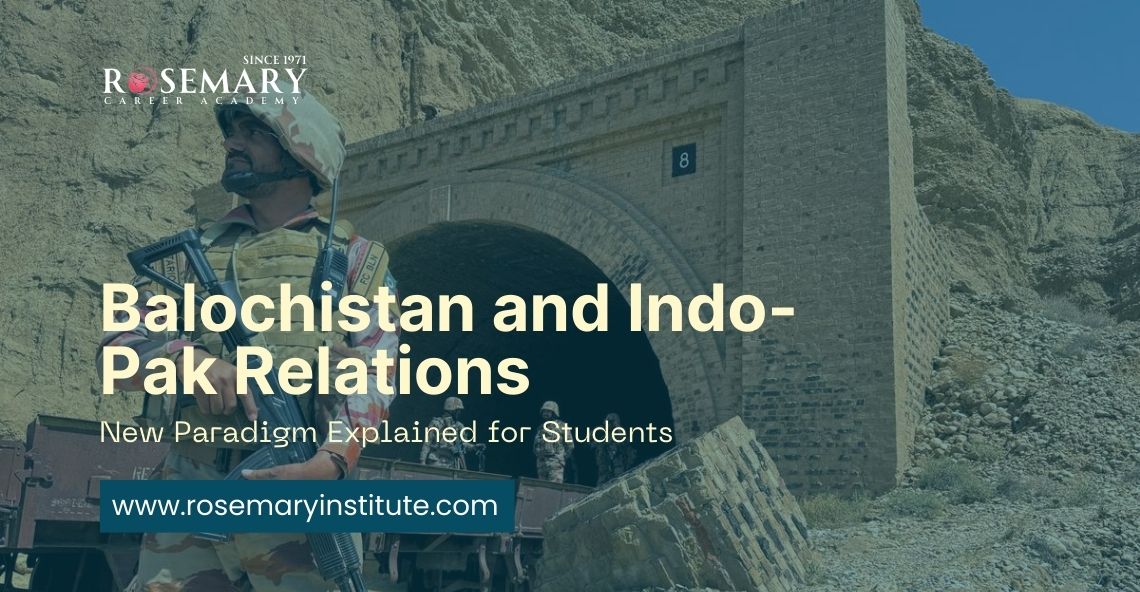India’s Strategic Shift on Balochistan: Indo-Pak Relations & Geopolitics Explained
On April 22, 2025, the serene town of Pahalgam in Jammu and Kashmir was shattered by a brutal terrorist attack that claimed the lives of 26 innocent civilians, including tourists. This heinous act not only disrupted the peace of the region but also ignited a nationwide outcry for justice and security. The Indian government’s swift response and the youth’s fervent demands underscore the nation’s resilience and determination to combat terrorism.

Background: Understanding Balochistan
Balochistan is Pakistan’s largest province by area, covering nearly 44% of the country’s land. Despite its size and rich natural resources (gas, minerals, and coastline), it remains the most economically underdeveloped province with a population of around 13 million.
Historically, Balochistan has had a complex relationship with Pakistan. After the 1947 Partition, Baloch leaders sought greater autonomy rather than full integration. However, the newly-formed Pakistan annexed the region, leading to continuous tensions. Since then, Baloch nationalist movements have demanded more control over their resources, political freedom, and respect for their unique ethnic identity.
Recent Developments: Growing Tensions and New Narratives
In recent years, the Balochistan conflict has gained international attention. Baloch groups have accused the Pakistani government of exploitation, human rights violations, and suppression of their culture.
A major turning point came when India’s Prime Minister openly acknowledged the Baloch people’s struggle. In a significant diplomatic move, India raised concerns about human rights issues in Balochistan, Gilgit-Baltistan, and Pakistan-occupied Kashmir (PoK). This marked a noticeable shift from India’s earlier restrained approach, bringing Balochistan into the spotlight of Indo-Pak relations.
India's Historical Stand: From Non-Alignment to Active Engagement
At the time of India’s independence, Prime Minister Jawaharlal Nehru followed a non-alignment policy. India chose not to interfere in the internal matters of other countries, focusing instead on peaceful coexistence (as outlined in the Panchsheel Agreement).
However, India’s stand on regional conflicts has evolved:
- In 1971, India supported the freedom struggle in East Pakistan, which led to the creation of Bangladesh.
- India has shown diplomatic support for democratic and autonomy movements in neighboring countries like Nepal and Sri Lanka.
Initially, India treated the Balochistan issue cautiously, maintaining a neutral stance. But growing concerns over Pakistan’s activities, including cross-border terrorism and the use of PoK for anti-India propaganda, led to a rethinking of this approach.
The Shift: India's New Approach to Balochistan
In recent years, India’s strategy has become more assertive:
- By highlighting Pakistan’s internal issues, especially in Balochistan, India aims to counter Pakistan’s repeated allegations regarding Kashmir.
- India’s open support for the Baloch people emphasizes concerns over human rights abuses and suppression of ethnic minorities within Pakistan.
- The new approach can be seen as part of India’s broader regional policy that focuses on exposing Pakistan’s contradictions on global platforms.
This is sometimes described as a “Carrot-and-Stick” Policy — India balances diplomatic engagement (carrot) with strategic pressure (stick) to safeguard national interests.
Challenges Ahead for India
While India’s new posture on Balochistan highlights human rights and democratic values, there are challenges:
- Avoiding direct military involvement is crucial to prevent international backlash.
- Ensuring that support for Balochistan does not escalate into full-scale regional instability.
- Balancing diplomatic narratives without undermining India’s principled stand on respecting sovereignty and territorial integrity.
Thus, India must navigate carefully between moral responsibility and strategic interests.
Conclusion: A New Paradigm Emerging
Balochistan represents a major shift in India’s foreign policy thinking. By bringing Balochistan to the international stage, India is crafting a new strategy to counter Pakistan’s traditional Kashmir narrative.
The road ahead demands smart diplomacy, strategic patience, and strong advocacy for human rights. For students and young minds, understanding this issue provides insight into how geopolitics, ethics, and national interests intersect in today’s complex world.






India should support Balochistan for future security of India against Pakistan.
The balochistan issue reflects long standing grievances over autonomy, rights and development. India’s evolving stance marks a strategic shift, highlighting regional instability and human rights concerns. The recent terrorista attack further intensifies geopolitical tensions, reinforcing the need for decisive international action and counter terrorism co operation to ensure justice, peace and regional stability